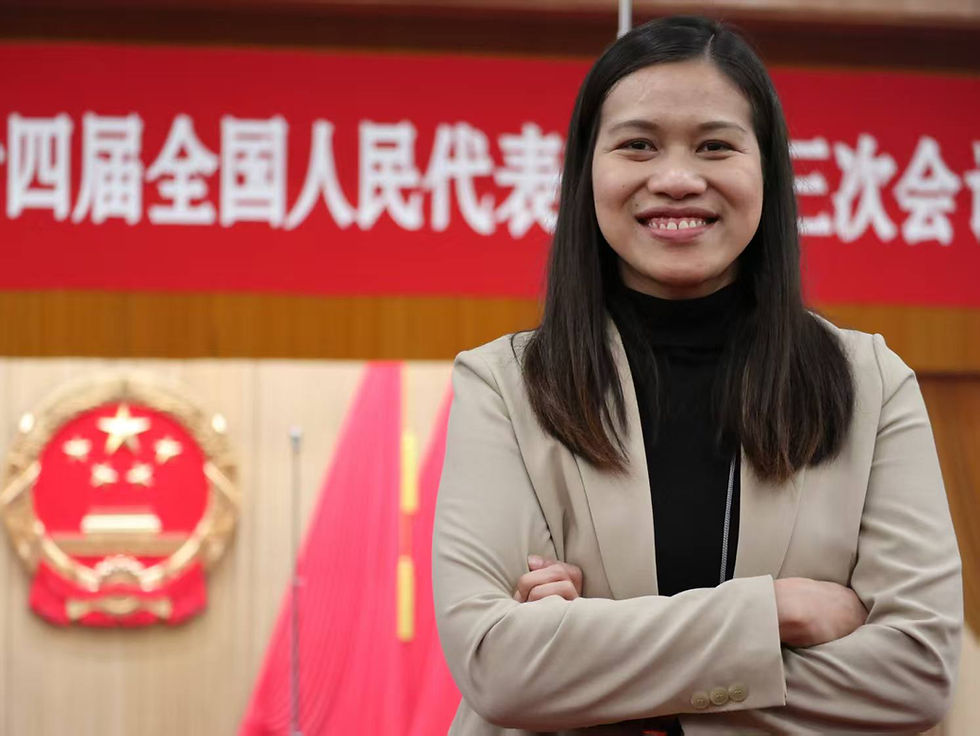Journalist Desca from ANTARA, Indonesia: AI as the Rock Star at Two Sessions 2025
- CAobservation

- 3月14日
- 讀畢需時 4 分鐘
已更新:3月18日
Editor's Note: Two sessions, the annual meetings of China's National People's Congress and the National Committee of the Chinese People's Political Consultative Conference concluded amidst global attention. This year's two sessions attracted more than 3000 Chinese and foreign journalists to register and participate, including over a thousand overseas journalists. From under the dome of the Great Hall of the People in Beijing to the lens of global media, China's two sessions have become a key window for observing the pulse of the world's second-largest economy and decoding global development opportunities.
In this feast of insights and information, the perspective of foreign journalists is particularly unique. They bring perspectives from different cultural backgrounds, using words and lenses to record China's development code. China-ASEAN Observation has specially invited journalists from ASEAN countries to share their views on China's Two Sessions. The intersection of these diverse perspectives may provide readers with a new dimension for understanding China.
Desca Lidya Natalia, Chief of Bureau of ANTARA, Indonesia National News Agency in Beijing

China’s parliamentary annual meeting, known as the “Two Sessions", officially concluded on March 11, 2025. This year’s Two Sessions was not my first experience covering the event. It was my second time reporting on it, and I found that there were even more valuable insights to take away from this year’s discussions.
I have three key highlights from Two Sessions 2025:
1. AI as the rock star
During the opening session of the National People's Congress (NPC) meeting on March 5, 2025, Premier Li Qiang announced that China’s economic growth target would remain at "around 5%", alongside a higher fiscal deficit target of 4% of GDP and stable goals for creating over 12 million new urban jobs. To stimulate the economy, the government plans to issue 1.3 trillion yuan in ultra-long special treasury bonds and 4.4 trillion yuan in local government special-purpose bonds.
Premier Li also acknowledged that consumption remains weak and that job creation and income growth face significant pressure, further exacerbated by external challenges such as unilateralism and protectionism.
As a response, Premier Li pledged to improve conditions for private companies and boost business confidence by strengthening legal protections and policy support for private enterprises. He also emphasized the need to unleash innovation in the high-tech sector and accelerate developments in AI and 6G technology.
This signals a major shift in focus for this year’s Two Sessions. Last year, the Chinese government strongly promoted "hardware industries", such as New Electric Vehicles (NEVs) and solar panels, prioritizing green industries and their derivatives. However, in 2025, the discussions have centered on AI-driven companies, especially following the global shockwave caused by DeepSeek just weeks before Two Sessions.

2. Meeting humans behind AI industries
The Two Sessions is also a rare moment when journalists can directly meet with nearly 3,000 NPC deputies, representing diverse backgrounds—business leaders, bureaucrats, military officials, athletes, ethnic and religious representatives, and even celebrities.
While some well-known figures like former NBA star Yao Ming (standing over 2 meters tall) naturally attracted attention, most of the NPC attendees were middle-aged Chinese in black suits—faces that reporters needed to memorize carefully.
However, among them were also China’s top tech CEOs, whose businesses are currently receiving strong government support. High-profile figures such as Lei Jun, He Xiaopeng, Chen Tianshi, Zhou Yunjie, Dong Mingzu, and Liu Qingfeng—leaders of Xiaomi, XPeng, Cambricon Technologies, Haier Group, Gree Electric, and iFlytek—were all NPC deputies.
While Chinese reporters may already be familiar with these business leaders, for foreign journalists, getting the opportunity to ask them questions and gain insights into their views on Two Sessions was quite challenging. They were the "rock stars" of the NPC 2025.
The open day sessions for each province also provided valuable insights. I attended the Guangdong Open Day, where a four-hour-long session focused on the province's high-tech industry targets, particularly in AI, which is expected to be the backbone of Guangdong’s economy, both now and in the future.
3. Direction for China’s Foreign Policy
As a foreign journalist, the event I also anticipated was Foreign Minister Wang Yi's annual press conference, which provides a glimpse into China’s foreign policy direction for the coming year.
This year, China’s core message was centered on "stability" amid a changing and turbulent world.
According to Wang Yi, "This year, the international situation remains full of challenges. However, China’s diplomatic mission remains unchanged. We will, along with other countries, continue to uphold what is right, steer the direction of our era, defend international fairness and justice, and safeguard world peace and stability." This, in my view, is the key theme of China’s foreign policy strategy for 2025.
All in all, the Two Sessions remains China’s biggest annual political event. While some outcomes were predictable, others brought unexpected developments. However, when analyzing the results of Two Sessions, it is essential to view them through China’s perspective, rather than an outsider’s viewpoint. So, until next year.

(If you have specific expertise, or would like to share your thoughts, please send us your writings at CAobservation@outlook.com)




留言